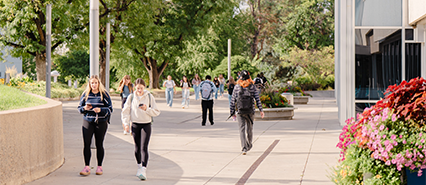Hazing Prevention and Response
| Policy Title: Hazing | Category: Campus Safety |
| Owner: Vice President of Operations and Chief Financial Officer | Policy ID#: 10.12.00 |
| Contact: Office of Campus Safety and Emergency Management | Effective Date: 06/17/2025 |
Viewing/Downloading Options:
|
PURPOSE:
Colorado State University Pueblo holds no higher value than the safety and wellbeing of its students. Nationwide, hazing in higher education is recognized as an injurious practice that should not be tolerated. In 2024, the United States Congress enacted the Stop Campus Hazing Act, 138 Stat. 2597, Public Law No. 118-173 (12/23/2024) (“SCHA”), requiring higher education institutions to adopt and publish policies prohibiting hazing on campus, and to report hazing incidents along with crime statistics in its annual Clery Act security report. In addition, Colo. Rev. Stat. § 18-9-124 makes hazing, as defined in that statute, a criminal offense. This policy is adopted in compliance with the SCHA and Colorado law.
POLICY APPLIES TO (Persons affected by):
All persons subject to the jurisdiction and authority of CSU Pueblo (“University”) to impose disciplinary measures, including, but not limited to, students, student organizations, faculty, staff, volunteers, and affiliates, are subject to this policy.
DEFINITIONS:
Clery Act: The Jeanne Clery Campus Safety Act (20 U.S.C.A. §1092(f) and implementing regulations, 34 C.F.R. §668.41 and 668.46).POLICIES OF COLORADO STATE UNIVERSITY PUEBLO Hazing 2
Hazing: The term “Hazing” as used herein means any activity--
- By which a person intentionally, knowingly or recklessly endangers the health or safety of or causes a risk of bodily injury to an individual for purposes of initiation or admission into or affiliation with any student organization; and
- That causes or creates a risk, above the reasonable risk encountered in the course of participation in the institution of higher education or the organization (such as the physical preparation necessary for participation in an athletic team), of physical or psychological injury. Examples include, but are not limited to:
- Forced and prolonged physical activity;
- Whipping, beating, striking, electronic shocking, placing of a harmful substance on someone’s body, or similar activity;
- Causing, coercing, or otherwise inducing sleep deprivation, exposure to the elements, confinement in a small space, extreme calisthenics, or other similar activity;
- Causing, coercing, or otherwise inducing another person to consume food, liquid, alcohol, drugs, or other substances;
- Causing, coercing, or otherwise inducing another person to perform sexual acts;
- Any activity that places another person in reasonable fear of bodily harm through the use of threatening words or conduct;
- Any activity against another person that includes a criminal violation of law; and
- Any activity that induces, causes, or requires another person to perform a duty or task that involves a criminal violation of law.
Student Organization: An organization at CSU Pueblo, such as a club, society, association, varsity or junior varsity athletic team, club sports team, fraternity, sorority, band, or student government, in which two or more of the members are students enrolled at the University, whether or not the organization is established or officially recognized by the institution.
POLICY:
Hazing is strictly prohibited at CSU Pueblo, and any act that constitutes Hazing will be grounds for disciplinary action in accordance with the applicable policies and procedures of the University, including, but not limited to, the Student Code of Conduct, Faculty Handbook, Administrative Professional Handbook, and the state of Colorado’s handbook for classified employees.
Reporting Hazing
Any person who observes, participates in, or becomes aware of Hazing occurring at CSU Pueblo has the obligation to report it to the Office of Student Conduct and Community Standards either online, by email, or by calling the office at 719-549-2586. If a person is a Campus Security Authority (CSA), they must report it to the Office of Campus Safety and Emergency management via the CSA incident reporting form.POLICIES OF COLORADO STATE UNIVERSITY PUEBLO Hazing 3
Hazing Violation Statistics; Annual Fire Safety and Security Report
Pursuant to the SCHA and the CSU Pueblo policy on Campus Safety (Clery Act), the University will include information regarding Hazing violations in its Annual Fire Safety and Security Report (AFSSR), as follows:
- The number of Hazing incidents that were reported to Campus Security Authorities (see Campus Safety Policy) or to the Pueblo County Sheriff's Office at CSU Pueblo (PCSO) occurring on and after January 1, 2025, will be counted and compiled by CSU Pueblo. Hazing incidents will be counted per each single incident, provided that, if the same person or persons commit more than one Hazing act, and the time and place intervals separating each such act are insignificant, such acts shall be reported as a single hazing incident. These statistics will be reported commencing with the 2026 AFSSR containing statistics for calendar year 2025.
- A statement of CSU Pueblo’s current policies relating to Hazing as defined in this policy, how to report incidents of Hazing, the process used to investigate Hazing reports, and information on applicable state and local laws on Hazing.
- Information regarding Hazing prevention and awareness programs at CSU Pueblo, including a description of research-informed, campus-wide prevention programs designed to reach students, staff and faculty, which includes primary prevention strategies intended to stop hazing before hazing occurs, skill building for bystander intervention, information about ethical leadership, and the promotion of strategies for building group cohesion without Hazing.
Campus Hazing Transparency Report
-
- Annually commencing on July 1, 2025, CSU Pueblo will prepare a Campus Hazing Transparency Report in accordance with Section 3 of the SCHA, 20 U.S.C. 1092(f)(9)(A). The report will contain the following elements:
- The number of Hazing incidents involving Student Organizations that are established or recognized by CSU Pueblo, with the first such report to be published on the CSU Pueblo website on or before December 23, 2025.
- A summary of findings regarding Hazing violations of any such Student Organization that is found to be in violation of this policy, including:
- The name of each such Student Organization;
- A general description of the violation that resulted in a finding of responsibility, including whether the violation involved the abuse or illegal use of alcohol or drugs; the findings by CSU Pueblo; the dates on which the incident was alleged to have occurred, the investigation was initiated, the investigation ended with a finding that a hazing violation occurred, and the institution provided notice to the Student Organization of such finding.POLICIES OF COLORADO STATE UNIVERSITY PUEBLO Hazing 4
- A description of the Hazing awareness and prevention programs conducted by the University.
- The Campus Hazing Transparency Report will not include any personally identifiable information about any individual, or information from which an individual could be identified, in accordance with the Family Educational Rights and Privacy Act of 1974 (FERPA).
- Annually commencing on July 1, 2025, CSU Pueblo will prepare a Campus Hazing Transparency Report in accordance with Section 3 of the SCHA, 20 U.S.C. 1092(f)(9)(A). The report will contain the following elements:
- The Campus Hazing Transparency Report will be updated twice per calendar year, if any Hazing violations were found since the last annual report or update.
- The report will be published on the CSU Pueblo website and will include references to where to find the Hazing statistics for each of the last 5 years in which Hazing incidents were reported pursuant to the SCHA and the Clery Act; where to find the institution’s policies on Hazing; and any other information deemed pertinent by the University.
Hazing Investigations
All reports of hazing involving students as respondents will be referred to the Office of Student Conduct and Community Standards (OSCCS) to be investigated. The process that will be followed in is the process that is detailed in the Student Code of Conduct. In cases where the student is the complainant, and the respondent is either faculty, staff, or another from an outside organization, the Dean of Students will be notified and a joint investigation will be initiated involving the OSCCS and any other office that has joint jurisdiction, such as but not limited to, Human Resources, Campus Safety, Academic Affairs, Athletics, or an outside organization such as a Greek organization or an Honor Society. The Dean of Students will ensure advocacy for the student, while the OSCCS will assist in the investigative process.
Prevention Strategies
The Office of Campus Safety and Emergency Management (OCSEM) and the OSCCS will coordinate training with Student Organizations, Athletics, and other campus divisions, offices, and partners to conduct training sessions for faculty, staff, students, Campus Safety Authorities, and outside partners regarding Hazing. In addition, hazing awareness and prevention programs will be added to student orientation sessions and presented to faculty and staff at annual training meetings.
RESPONSIBILITIES:
Office of Student Conduct and Community Standards: Enforce the Student Code of Conduct and this policy with respect to Hazing incidents that are reported to the Office. Office of Campus Safety and Emergency Management, Clery Compliance Team: Annually gather Hazing incident reports and report them as required by the SCHA and the Clery Act in the Campus Hazing Transparency Report.POLICIES OF COLORADO STATE UNIVERSITY PUEBLO Hazing 5 Office of the Vice President for Student Affairs: Conduct hazing awareness and prevention programs for students.
RELATED LAWS, POLICIES & PROCEDURES:
CSU System policy on FERPA
CSU Pueblo policy on Campus Safety (Clery Act)
C.R.S. § 18-9-124
Stop Campus Hazing Act, Public Law 118–173
HISTORY:
Adopted:
Revised:
APPROVED: Rico Munn, Interim President
DATE: 6/18/2025


